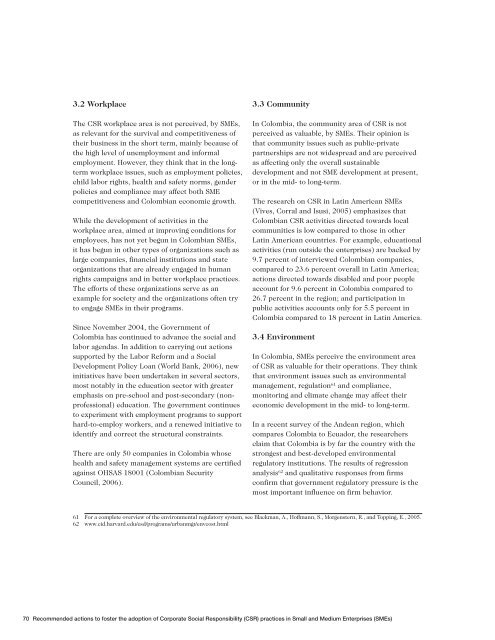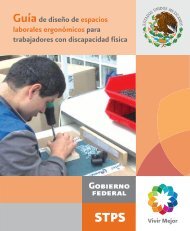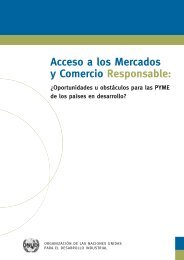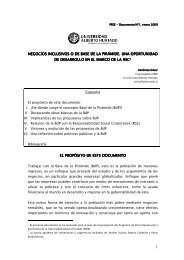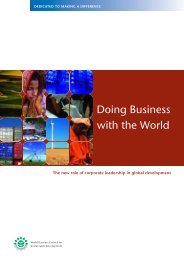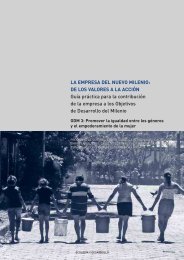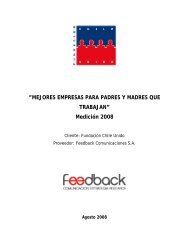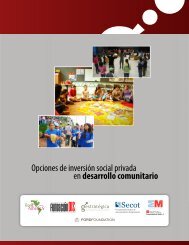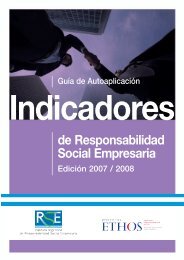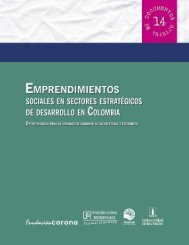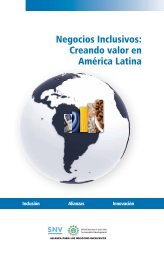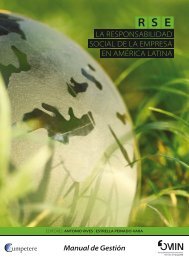3.2 WorkplaceThe CSR workplace area is not perceived, by SMEs,as relevant for <strong>the</strong> survival and competitiveness <strong>of</strong><strong>the</strong>ir business in <strong>the</strong> short term, mainly because <strong>of</strong><strong>the</strong> high level <strong>of</strong> unemployment and informalemployment. However, <strong>the</strong>y think that in <strong>the</strong> longtermworkplace issues, such as employment policies,child labor rights, health and safety norms, genderpolicies and compliance may affect both SMEcompetitiveness and Colombian economic growth.While <strong>the</strong> development <strong>of</strong> activities in <strong>the</strong>workplace area, aimed at improving conditions foremployees, has not yet begun in Colombian SMEs,it has begun in o<strong>the</strong>r types <strong>of</strong> organizations such aslarge companies, financial institutions and stateorganizations that are already engaged in humanrights campaigns and in better workplace practices.The efforts <strong>of</strong> <strong>the</strong>se organizations serve as anexample for society and <strong>the</strong> organizations <strong>of</strong>ten try<strong>to</strong> engage SMEs in <strong>the</strong>ir programs.Since November 2004, <strong>the</strong> Government <strong>of</strong>Colombia has continued <strong>to</strong> advance <strong>the</strong> social andlabor agendas. In addition <strong>to</strong> carrying out <strong>actions</strong>supported by <strong>the</strong> Labor Reform and a <strong>Social</strong>Development Policy Loan (World Bank, 2006), newinitiatives have been undertaken in several sec<strong>to</strong>rs,most notably in <strong>the</strong> education sec<strong>to</strong>r with greateremphasis on pre-school and post-secondary (nonpr<strong>of</strong>essional)education. The government continues<strong>to</strong> experiment with employment programs <strong>to</strong> supporthard-<strong>to</strong>-employ workers, and a renewed initiative <strong>to</strong>identify and correct <strong>the</strong> structural constraints.There are only 50 companies in Colombia whosehealth and safety management systems are certifiedagainst OHSAS 18001 (Colombian SecurityCouncil, 2006).3.3 CommunityIn Colombia, <strong>the</strong> community area <strong>of</strong> CSR is notperceived as valuable, by SMEs. Their opinion isthat community issues such as public-privatepartnerships are not widespread and are perceivedas affecting only <strong>the</strong> overall sustainabledevelopment and not SME development at present,or in <strong>the</strong> mid- <strong>to</strong> long-term.The research on CSR in Latin American SMEs(Vives, Corral and Isusi, 2005) emphasizes thatColombian CSR activities directed <strong>to</strong>wards localcommunities is low compared <strong>to</strong> those in o<strong>the</strong>rLatin American countries. For example, educationalactivities (run outside <strong>the</strong> enterprises) are backed by9.7 percent <strong>of</strong> interviewed Colombian companies,compared <strong>to</strong> 23.6 percent overall in Latin America;<strong>actions</strong> directed <strong>to</strong>wards disabled and poor peopleaccount for 9.6 percent in Colombia compared <strong>to</strong>26.7 percent in <strong>the</strong> region; and participation inpublic activities accounts only for 5.5 percent inColombia compared <strong>to</strong> 18 percent in Latin America.3.4 EnvironmentIn Colombia, SMEs perceive <strong>the</strong> environment area<strong>of</strong> CSR as valuable for <strong>the</strong>ir operations. They thinkthat environment issues such as environmentalmanagement, regulation 61 and compliance,moni<strong>to</strong>ring and climate change may affect <strong>the</strong>ireconomic development in <strong>the</strong> mid- <strong>to</strong> long-term.In a recent survey <strong>of</strong> <strong>the</strong> Andean region, whichcompares Colombia <strong>to</strong> Ecuador, <strong>the</strong> researchersclaim that Colombia is by far <strong>the</strong> country with <strong>the</strong>strongest and best-developed environmentalregula<strong>to</strong>ry institutions. The results <strong>of</strong> regressionanalysis 62 and qualitative responses from firmsconfirm that government regula<strong>to</strong>ry pressure is <strong>the</strong>most important influence on firm behavior.61 For a complete overview <strong>of</strong> <strong>the</strong> environmental regula<strong>to</strong>ry system, see Blackman, A., H<strong>of</strong>fmann, S., Morgenstern, R., and Topping, E., 2005.62 www.cid.harvard.edu/esd/programs/urbanmgt/envcost.html70 <strong>Recommended</strong> <strong>actions</strong> <strong>to</strong> <strong>foster</strong> <strong>the</strong> <strong>adoption</strong> <strong>of</strong> <strong>Corporate</strong> <strong>Social</strong> Responsibility (CSR) practices in Small and Medium Enterprises (SMEs)
However, market pressures, primarily exportmarkets, persist as a significant determinant <strong>of</strong>environmental behavior, despite <strong>the</strong> strong role <strong>of</strong><strong>the</strong> state. In this sense, trade is good for <strong>the</strong>environment. Those firms with a greaterparticipation in export markets rely more oninnovative solutions <strong>to</strong> pollution reduction ra<strong>the</strong>rthan end-<strong>of</strong>-<strong>the</strong>-pipe technologies, which treatpollution at <strong>the</strong> end <strong>of</strong> <strong>the</strong> production process. 63Moreover, considerable public and private resourceshave been committed <strong>to</strong> <strong>the</strong> reduction <strong>of</strong> pollution,resulting in improvements in water quality. 64The Renewable Energy index ranks Colombia 23 ou<strong>to</strong>f 109 countries (World Health Organization; WorldResource Institute, 2005; and International EnergyAgency, 2001) 65 . Moreover, <strong>the</strong>re are only 275 ISO14001 certified enterprises in Colombia (ISO 2005).As for Colombia’s engagement in <strong>the</strong> Kyo<strong>to</strong> Pro<strong>to</strong>col,<strong>the</strong>re are three registered Clean DevelopmentMechanism projects in <strong>the</strong> country 66 .Colombia’s emissions <strong>of</strong> Greenhouse Gas (GHGs) arevery modest (0.2 percent <strong>of</strong> global emissions, with 0.6percent <strong>of</strong> <strong>the</strong> global population). With <strong>the</strong>se lowintensity emissions, opportunities exist <strong>to</strong> mitigateemissions in key sec<strong>to</strong>rs. Opportunities for GHGmitigation are being pursued in renewable energy,wastewater treatment and energy efficiency (Jepirachi,Amoya, Rio Frio and Furatena projects). Adaptationmeasures are also being explored and implementedthrough <strong>the</strong> Amoya region and <strong>the</strong> recently approvedIntegrated National Adaptation Project. Still, <strong>the</strong>National Strategic Study and <strong>the</strong> first NationalCommunication estimated that 21 percent <strong>of</strong> GHGemissions in <strong>the</strong> country are due <strong>to</strong> land use changeand that over 40 percent <strong>of</strong> <strong>the</strong> opportunities for GHGmitigation in <strong>the</strong> country are related <strong>to</strong> reforestation.Yet, so far, only one carbon sink project for <strong>the</strong> Kyo<strong>to</strong>Pro<strong>to</strong>col is in <strong>the</strong> portfolio (World Bank, 2006).Even in Colombia’s delicate environment,environmentally responsible activities are perceivedby companies as related not <strong>to</strong> preservation orconservation, but <strong>to</strong> <strong>the</strong> improvement <strong>of</strong>competitiveness because <strong>of</strong> <strong>the</strong>ir ability <strong>to</strong> reduce costsand promote efficient consumption (Gutierrez, 2004).On <strong>the</strong> o<strong>the</strong>r hand, Colombian NGOs are particularlyactive on environmental preservation campaigns. 67The Colombian Council for Sustainable Developmentdefines Environmental responsibility as ‘Eco-efficiency,’described as “<strong>the</strong> continuous process <strong>of</strong> maximization<strong>of</strong> productivity <strong>of</strong> resources minimizing waste andemissions, and generating value for <strong>the</strong> company, forits cus<strong>to</strong>mers, shareholders and o<strong>the</strong>rs stakeholders”.Environmental activities include, among o<strong>the</strong>rs,minimization <strong>of</strong> waste generation, control and integrity<strong>of</strong> <strong>the</strong> process, <strong>the</strong> control and mitigation throughsecondary reductions, adequate moni<strong>to</strong>ring systemand waste management, impact assessment,and reclamations.The results <strong>of</strong> a study in Colombia 68 confirm <strong>the</strong>effectiveness <strong>of</strong> using information as a <strong>to</strong>ol forpromoting pollution abatement. The simple act <strong>of</strong>granting <strong>the</strong> public access <strong>to</strong> pollution moni<strong>to</strong>ringinformation <strong>of</strong> industrial firms proved <strong>to</strong> be a significantfac<strong>to</strong>r in encouraging environmental activities. This is alow cost and easily replicated strategy that should befollowed in o<strong>the</strong>r CSR areas as well.4 <strong>Recommended</strong> ActionsThe main ac<strong>to</strong>rs able <strong>to</strong> streng<strong>the</strong>n CSR in Colombiahave been classified in <strong>the</strong> following four categories:a) Multilateral Development Institutions (MDIs), b)national governments and local authorities, c) businessassociations, and d) civil society. These fourcategories <strong>of</strong> ac<strong>to</strong>rs may act via all or some <strong>the</strong>following strategies, as defined in <strong>the</strong> Introduc<strong>to</strong>ry63 The survey shows also that in Colombia well over half <strong>of</strong> <strong>the</strong> firms that engaged in pollution reduction activities did so with some kind <strong>of</strong>change in <strong>the</strong> production process. Water pollution reduction entailed more end-<strong>of</strong>-<strong>the</strong>-pipe technology while air pollution was morefrequently accomplished through change in processes. Almost 2 out <strong>of</strong> 3 firms that reduced water pollution improved <strong>the</strong>ir long-termcompetitiveness in doing so. For air, <strong>the</strong> prospects are even more positive, with 4 out <strong>of</strong> 5 firms improving <strong>the</strong>ir long-term pr<strong>of</strong>itability.64 For a complete analysis, see <strong>the</strong> valuable Project Enhancing Competitiveness While Protecting <strong>the</strong> Environment, run by Universidad delos Andes in Bogota, Colombia; Escuela Superior Politécnica del Li<strong>to</strong>ral (ESPOL) in Guayaquil, Ecuador; and Universidad del Pacífico inLima, Colombia and sponsored by Corporacion Andino de Fomen<strong>to</strong>, visit: www.cid.harvard.edu/esd/programs/urbanmgt/envcost.html65 www.maplecr<strong>of</strong>t.com66 www.unfccc.int67 NGOs are also active in areas <strong>of</strong> conflict, generally where <strong>the</strong>re is an internal armed conflict, i.e. Peace Brigades International (PBI),Consultancy for Human Rights and Displacement (CODEHES),68 www.cid.harvard.edu/esd/programs/urbanmgt/envcost.htmlColombia 71
- Page 1 and 2:
Recommended actionsto foster the ad
- Page 3 and 4:
Recommended actionsto foster the ad
- Page 5 and 6:
table of contentsI Acknowledgements
- Page 7:
Chapter 6: Mexico1 Executive Summar
- Page 10 and 11:
acronymsCDMCSRECFLAFSCGDPGHGGRIHRWI
- Page 12 and 13:
strong internal relationship, in ot
- Page 14 and 15:
programs that affect the private se
- Page 16 and 17:
Section Four - Recommended Actions
- Page 18 and 19:
(Technology Index, Public Instituti
- Page 20 and 21:
BibliographyESADE, SDA Bocconi, Nor
- Page 22 and 23:
The following chart shows competiti
- Page 24 and 25:
CSR area significanceThe following
- Page 26 and 27:
structured philanthropic policies,
- Page 28 and 29: the private sector and to develop g
- Page 30 and 31: c. Facilitating, recommended action
- Page 32 and 33: BibliographyAnselmi, P. (2005) ‘L
- Page 34 and 35: APPENDIX 1 - ARGENTINA’S STAKEHOL
- Page 36 and 37: 28 Recommended actions to foster th
- Page 38 and 39: 2 Economic and SocialFrameworkBrazi
- Page 40 and 41: 3 Current State of CSRThe concept o
- Page 42 and 43: micro and small companies based on
- Page 44 and 45: Brazil ratified the Kyoto Protocol
- Page 46 and 47: - Improve monitoring systems andenv
- Page 48 and 49: e. Endorsing, recommended actions f
- Page 50 and 51: Websites consultedwww.accountabilit
- Page 52 and 53: APPENDIX 1 - BRAZIL’S STAKEHOLDER
- Page 54 and 55: APPENDIX 1 - BRAZIL’S STAKEHOLDER
- Page 56 and 57: A stable macroeconomic framework, s
- Page 58 and 59: An investigation of Chile’s equit
- Page 60 and 61: CSR area significanceThe following
- Page 62 and 63: powerful, but are mainly involved i
- Page 64 and 65: Fomento al Desarrollo Científico y
- Page 66 and 67: a. Improving Promotion and Advocacy
- Page 68 and 69: Websites consultedwww.accionrse.clw
- Page 70 and 71: APPENDIX 1 - CHILEAN STAKEHOLDER MA
- Page 73 and 74: Chapter 4: Colombia1 Executive Summ
- Page 75 and 76: In addition, corruption is a widely
- Page 77: CSR area significancesupply chain m
- Page 81 and 82: - Sponsor a human rights campaign t
- Page 83 and 84: . Improving Promotion and Advocacy,
- Page 85 and 86: Websites consultedwww.accountabilit
- Page 87 and 88: APPENDIX 1 - COLOMBIAN STAKEHOLDER
- Page 89 and 90: APPENDIX 1 - COLOMBIAN STAKEHOLDER
- Page 91 and 92: Chapter 5: El Salvador1 Executive S
- Page 93 and 94: El Salvador’s competitiveness. Co
- Page 95 and 96: ecome key organizations in the batt
- Page 97 and 98: According to Vives, Corral and Isus
- Page 99 and 100: subsequent survey, by the World Ban
- Page 101 and 102: following strategies, as defined in
- Page 103 and 104: 4.4 Civil SocietyIn this study, civ
- Page 105 and 106: Tsukamoto, M, Twose, N., (2003) ‘
- Page 107 and 108: APPENDIX 1 - EL SALVADOR’S STAKEH
- Page 109 and 110: Chapter 6: Mexico1 Executive Summar
- Page 111 and 112: OrganizationWEFWEFWEFIndexNumber of
- Page 113 and 114: there is a general confusion about
- Page 115 and 116: CSR area significancemaxCSR actual
- Page 117 and 118: and because of institutional voids
- Page 119 and 120: - Improve monitoring systems andenv
- Page 121 and 122: - Participate in the publication of
- Page 123 and 124: López-Acevedo, G., (2006) ‘Mexic
- Page 125 and 126: AppendixThe following stakeholder m
- Page 127: APPENDIX 1 - MEXICAN STAKEHOLDER MA
- Page 130 and 131:
Peruvian civil society has a strong
- Page 132 and 133:
environment, and they have waste tr
- Page 134 and 135:
Not even the lack of relations and
- Page 136 and 137:
- Create awareness of accountabilit
- Page 138 and 139:
These two groups will likely implem
- Page 140 and 141:
Websites consultedwww.accountabilit
- Page 142 and 143:
APPENDIX 1 - PERUVIAN STAKEHOLDER M
- Page 145 and 146:
Chapter 8: Venezuela1 Executive Sum
- Page 147 and 148:
OrganizationWEFIndexNumber of Count
- Page 149 and 150:
3 Current State of CSRCSR actual po
- Page 151 and 152:
cooperatives and farmers 114 Unfort
- Page 153 and 154:
a. Mandating, recommended actions f
- Page 155 and 156:
BibliographyArmas, V. (1999) ‘Esp
- Page 157:
AppendixThe following stakeholder m


